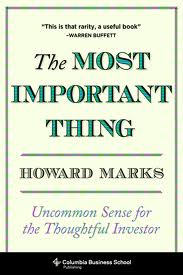Continuation of portfolio management highlights from Howard Marks’ book, The Most Important Thing: Uncommon Sense for the Thoughtful Investor, Chapter 16 “The Most Important Thing Is…Appreciating the Role of Luck.” Luck, Capital Preservation
“We have to practice defensive investing, since many of the outcomes are likely to go against us. It’s more important to ensure survival under negative outcomes than it is to guarantee maximum returns under favorable ones.”
Luck, Process Over Outcome
“The investment world is not an orderly and logical place where the future can be predicted and specific actions always produce specific results. The truth is, much in investing is ruled by luck. Some may prefer to call it chance or randomness, and those words do sound more sophisticated than luck. But it comes down to the same thing: a great deal of the success of everything we do as investors will be heavily influenced by the roll of the dice.”
“Randomness (or luck) plays a huge part in life’s results, and outcomes that hinge on random events should be viewed as different from those that do not. Thus, when considering whether an investment record is likely to be repeated, it is essential to think about the role of randomness in the manager’s results, and whether the performance resulted from skill or simply being lucky.”
“Every once in a while, someone makes a risky bet on an improbable or uncertain outcome and ends up looking like a genius. But we should recognize that it happened because of luck and boldness, not skill…In the short run, a great deal of investment success can result from just being in the right place at the right time…the keys to profit are aggressiveness, timing and skill, and someone who has enough aggressiveness at the right time doesn’t need much skill.”
“…randomness contributes to (or wrecks) investment records to a degree that few people appreciate fully…We all know that when things go right, luck looks like skill. Coincidence looks like causality. A ‘lucky idiot’ looks like a skilled investor. Of course, knowing that randomness can have this effect doesn’t make it easy to distinguish between lucky investors and skillful investors.”
“Investors are right (and wrong) all the time for the ‘wrong reason’…The correctness of a decision can’t be judged from the outcome. Nevertheless, that’s how people assess it. A good decision is one that’s optimal at the time that it’s made, when the future is by definition unknown. Thus, correct decisions are often unsuccessful, and vice versa.”
“[Nassim] Taleb’s idea of ‘alternative histories’ – the other things that reasonably could have happened – is a fascinating concept, and one that is particularly relevant to investing.
Most people acknowledge the uncertainty that surrounds the future, but they feel that at least the past is known and fixed. After all, the past is history, absolute and unchanging. But Taleb points out that the things that happened are only a small subset of the things that could have happened. Thus, the fact that a stratagem or action worked – under the circumstances that unfolded – doesn’t necessarily prove the decision behind it was wise.
Maybe what ultimately made the decision a success was a completely unlikely event, something that was just at matter of luck. In that case that decision – as successful as it turned out to be – may have been unwise, and the many other histories that could have happened would have shown the error of the decision.”
“What is a good decision?…A good decision is one that a logical, intelligent and informed person would have made under the circumstance as they appeared at the time, before the outcome was known.”
“Even after the fact, it can be hard to be sure who made a good decision based on solid analysis but was penalized by a freak occurrence, and who benefited from taking a flier…past returns are easily assessed, making it easy to know who made the most profitable decision. It’s easy to confuse the two, but insightful investors must be highly conscious of the difference.
In the long run, there’s no reasonable alternative to believing that good decisions will lead to investor profits. In the short run, however, we must be stoic when they don’t.”
Luck, Historical Performance Analysis, Expected Return, Volatility
“Investment performance is what happens to a portfolio when events unfold. People pay great heed to the resulting performance, but the questions they should ask are: were the events that unfolded (and the other possibilities that didn’t unfold) truly within the ken of the portfolio manager? And what would the performance have been if other events had occurred instead? Those…are Taleb’s ‘alternative histories.’”
“…investors of the ‘I know’ school…feel it’s possible to know the future, they decide what it will look like, build portfolios designed to maximize returns under that one scenario, and largely disregard the other possibilities. The sub-optimizers of the ‘I don’t know’ school, on the other hand, put their emphasis on constructing portfolios that will do well in the scenarios they consider likely and not too poorly in the rest…
Because their approach is probabilistic, investors of the ‘I don’t know’ school understand that the outcome is largely up to the gods, and thus that the credit or blame accorded the investors – especially in the short run – should be appropriately limited.”
“Randomness alone can produce just about any outcome in the short run…market movements can easily swamp the skillfulness of the manager (or lack thereof).”
For further reading on luck and process over outcome: Howard Marks wrote an entire memo on the topic in Jan 2014 titled Getting Lucky. One of my favorite articles on this topic is from Michael Mauboussin & James Montier on Process Over Outcome. Michael Mauboussin recently wrote an entire book, The Success Equation, dedicated to untangling skill and luck.


